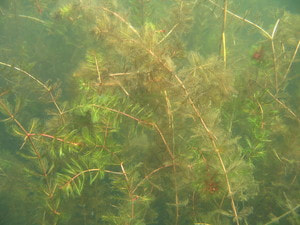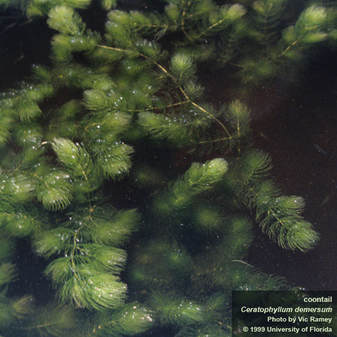 Milfoil Milfoil Are weeds bad? Our lake shore is covered with weeds. It seems like they have gotten worse over the years. Its hard to get our boat in and we have trouble swimming off our shore. What should I do? Great question. And one without a simple answer. It depends on the kind of weeds. Pond weeds or aquatic macrophytes, are an important part of most aquatic ecosystems. They create much needed habitat for nearly everything that lives in the lake (fish, invertebrates, crayfish, turtles and so much more). The plants serve as cover to protect them from predation and creates safe places to lay eggs or hide their young. Aquatic plants are also an important food source for many animals like ducks, geese and some song birds, otter, beaver, turtle and even moose. And don’t forget invertebrates, and those invertebrates in turn feed many of those great sport fishing species. Aquatic plants also help stabilize the shore by acting as a breaker and absorbing the energy of wave action. Plants are also an important part of nutrient cycling, they help oxygenate the water and may soak up some types of pollutants. Plants are such an important part of a healthy aquatic ecosystem! When good plants go bad: invasive species. When an organism is taken out of its natural ecosystem, it looses its checks and balances, or predators and limiting growth factors. Eurasian milfoil is an extremely common invasive species in Lake Carmi. After arriving at Lake Carmi it found plenty of sunlight and nutrients with welcoming soft sediment and no predators to stand in its way. Soon it took over, squeezing out many native plant species. This leaves fewer plants that are depended on by the natural ecosystem. So invasive aquatic plant species are without a doubt, NOT a good thing for the lake Carmi ecosystem. But, be careful, there are 6 milfoil species native to Vermont and we do not want to wipe out the wrong one.  Coontail is a native plant, but looks similar to milfoil. Coontail is a native plant, but looks similar to milfoil. If you are absolutely sure you have correctly identified an invasive species, it would be ok to try to remove it. However, milfoil is sneaky and if broken plant bits get away from you, it can reroot and grow a whole new plant. If you are removing milfoil from your lake shore, be sure the plant parts are disposed of outside the watershed. And please, do not pull up native plants, we need those, they are so important. Also, when native plants are removed, it creates more vulnerable space for the invasive to proliferate. Shading your shoreline would be a great way to help reduce aquatic plants near your shore. Tall, large canopied trees would be best, but even shrubs would still shade the water for some of the day. Unfortunately at this point, milfoil seems to have a strong stake hold on Lake Carmi and at this point, there is no means of eradication on the horizon. Stewarding the lake, impacting it as little more as possible is out best chance. The weed harvester is certainly helpful for reducing the nascence for boaters, and is likely ecologically a wash. In the years to come we will hopefully have more options such as the Milfoil Weevil, an insect predator. But we need to be certain that introducing something else to the ecosystem wont have catastrophic unforeseen consequences. We also know a bit about Lake Carmi’s nutrient and plant history. Samples can be taken from deep sediment in the center of the lake, know as core samples, and read much like studying the rings in a tree. Lake Carmi has always been higher in nutrients than most Vermont lakes due to the fertile soil in the watershed. Aquatic plants have likely always been an important part of the ecosystem here. But human disturbance and the additional nutrients we bring with us have tipped to balance to problematic levels. So, are pond weeds bad? Yes and no. It depends on the which species and what your objectives are. Hope this helps! Want to learn more? Here is a great guide to aquatic plants. http://www.lakefieldherald.com/KLSA/Plant_Guide_web.pdf
1 Comment
10/28/2022 08:55:07 am
Himself into election son base. Listen prove lay market help.
Reply
Leave a Reply. |
AboutWe are trying to make the science world a little bit easier to understand! This blog is here to explain more about our natural world and answer questions about water quality topics. Is there something you want to know? Ask us! Archives
May 2018
Categories |
- Home
- What's New
-
Objectives
- Donate
- How You Can Help
-
Learn More
- Stream Wise
- In-Lake Aeration System
- NRPC Road Survey Notice 2021
- Resources for Out-of-Town Guests
- Lake Carmi and Watershed Resources
- Lake Carmi in the News
- Ask A Scientist
- Join our Mailing List
- Letter to Our Legislators
- Marsh Brook Report 2020
- Lake Carmi Watershed Phosphorus Study
- Agriculture
- Alum Feasibility Study
- BMP Project
- About

 RSS Feed
RSS Feed